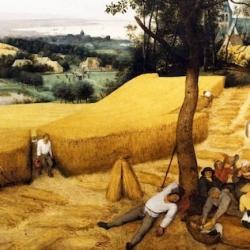Heiner Ruschaupt writes: “In Greek society labor was viewed as an inescapable fate imposed by the gods. To be like the gods meant to live free from labor. In the world of the ancient Orient, labor was viewed as a burden, as slave labor for the gods, who therefore were free from labor. The goal was to withdraw from this service, from this labor as far as possible. Labor was a burden without dignity” (quoted in Thomas Schirrmacher, Love Is the Fulfillment of the Law, 25).
The biblical portrait of God couldn’t be more starkly different. Yahweh is at work before human beings are created, and throughout Scripture Before He is at rest, before He is enthroned, before He is a warrior, He is portrayed as a laborer. Making Adam, Yahweh is a potter working His clay. Before Adam tills, Yahweh plants.
As “Shepherd,” Yahweh cares for a flock (Psalm 23), as does Jesus (John 10). He plants a vine, cares for it, and builds a wall around it (Psalm 80; Isaiah 5). Proverbs 8 pictures Yahweh as an architect measuring and building the cosmic house, with Wisdom beside him as a “craftsman” (‘amon). Abraham looks for a city whose “builder and maker is God” (Hebrews 11).
Jesus is a carpenter who builds His house-church in the power of the Creator Spirit (the Spirit of Bezalel). When Paul isn’t making tents he’s working as an apostolic “co-laborer” with God (1 Corinthians 3:9).















